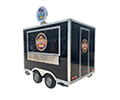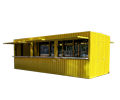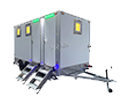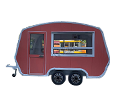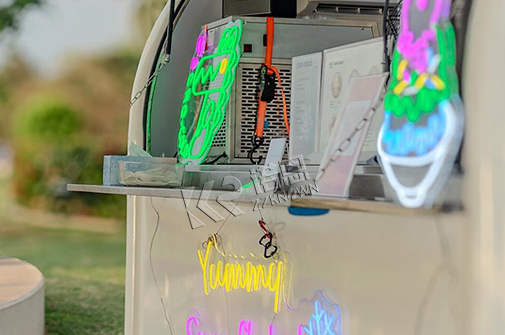The taxes and customs fees for importing a food truck into Germany can vary depending on several factors, including the truck’s value, origin, and specific regulations related to vehicle importation. Here's an overview of what you might expect:
1. Customs Duty
Customs duties are usually applied based on the truck’s classification under the Harmonized System (HS) code and its origin. If you are importing a food truck from a non-EU country (e.g., China), the duty rate is typically around 10% of the customs value. The customs value is usually the price of the truck, plus shipping and insurance costs.
If the food truck is imported from another EU country, there are no customs duties, as the EU operates as a single customs area.
2. Value Added Tax (VAT)
Germany applies a 19% VAT (Mehrwertsteuer, or MwSt) on most goods imported into the country. This tax is levied on the total cost of the goods, including the customs duty and shipping costs. If the food truck is intended for business use, you may be able to reclaim the VAT through your German VAT registration, subject to certain conditions.
- Import VAT: 19% is standard, but a reduced rate of 7% may apply for certain goods, though this is unlikely to apply to a food truck.
3. Registration and Vehicle Taxes
Once the food truck is in Germany, you’ll need to register it with the German vehicle registration authorities (Kfz-Zulassungsstelle). Vehicle taxes vary depending on the truck's engine size, CO2 emissions, and weight. You will also need to ensure the food truck complies with local safety and emissions standards.
4. Additional Costs
There might be additional fees for:
- Customs clearance and handling: If you use a customs broker to clear the truck through customs, expect to pay their service fee.
- Inspection and compliance checks: Depending on the truck’s specifications, it may need to undergo modifications to meet German road safety standards (e.g., emissions, lighting, etc.).
5. Exemptions or Discounts
In some cases, depending on the specific nature of the food truck and its usage, you might qualify for exemptions or reductions. For instance, if the vehicle is considered an "environmentally friendly" vehicle with lower emissions, you may receive some tax advantages or benefits in certain cities.
Conclusion
In summary, importing a food truck into Germany from a non-EU country like China generally involves:
- 10% customs duty on the value of the vehicle + shipping + insurance.
- 19% VAT on the total cost including duty.
- Additional fees for registration, inspections, and potential vehicle taxes.
It's advisable to consult with a customs agent or a local expert to get a precise estimate and ensure that all the legal and regulatory requirements are met.


 Russian
Russian  Albanian
Albanian  Arabic
Arabic  Amharic
Amharic  Azerbaijani
Azerbaijani  Irish
Irish  Estonian
Estonian  Odia (Oriya)
Odia (Oriya)  Basque
Basque  Belarusian
Belarusian  Bulgarian
Bulgarian  Icelandic
Icelandic  Polish
Polish  Bosnian
Bosnian  Persian
Persian  Afrikaans
Afrikaans  Tatar
Tatar  Danish
Danish  German
German  French
French  Filipino
Filipino  Finnish
Finnish  Frisian
Frisian  Khmer
Khmer  Georgian
Georgian  Gujarati
Gujarati  Kazakh
Kazakh  Haitian Creole
Haitian Creole  Korean
Korean  Hausa
Hausa  Dutch
Dutch  Kyrgyz
Kyrgyz  Galician
Galician  Catalan
Catalan  Czech
Czech  Kannada
Kannada  Corsican
Corsican  Croatian
Croatian  Kurdish (Kurmanji)
Kurdish (Kurmanji)  Latin
Latin  Latvian
Latvian  Lao
Lao  Lithuanian
Lithuanian  Luxembourgish
Luxembourgish  Kinyarwanda
Kinyarwanda  Romanian
Romanian  Malagasy
Malagasy  Maltese
Maltese  Marathi
Marathi  Malayalam
Malayalam  Malay
Malay  Macedonian
Macedonian  Maori
Maori  Mongolian
Mongolian  Bengali
Bengali  Myanmar (Burmese)
Myanmar (Burmese)  Hmong
Hmong  Xhosa
Xhosa  Zulu
Zulu  Nepali
Nepali  Norwegian
Norwegian  Punjabi
Punjabi  Portuguese
Portuguese  Pashto
Pashto  Chichewa
Chichewa  Japanese
Japanese  Swedish
Swedish  Samoan
Samoan  Serbian
Serbian  Sesotho
Sesotho  Sinhala
Sinhala  Esperanto
Esperanto  Slovak
Slovak  Slovenian
Slovenian  Swahili
Swahili  Scots Gaelic
Scots Gaelic  Cebuano
Cebuano  Somali
Somali  Tajik
Tajik  Telugu
Telugu  Tamil
Tamil  Thai
Thai  Turkish
Turkish  Turkmen
Turkmen  Welsh
Welsh  Uyghur
Uyghur  Urdu
Urdu  Ukrainian
Ukrainian  Uzbek
Uzbek  Spanish
Spanish  Hebrew
Hebrew  Greek
Greek  Hawaiian
Hawaiian  Sindhi
Sindhi  Hungarian
Hungarian  Shona
Shona  Armenian
Armenian  Igbo
Igbo  Italian
Italian  Yiddish
Yiddish  Hindi
Hindi  Sundanese
Sundanese  Indonesian
Indonesian  Javanese
Javanese  Yoruba
Yoruba  Vietnamese
Vietnamese  Hebrew
Hebrew